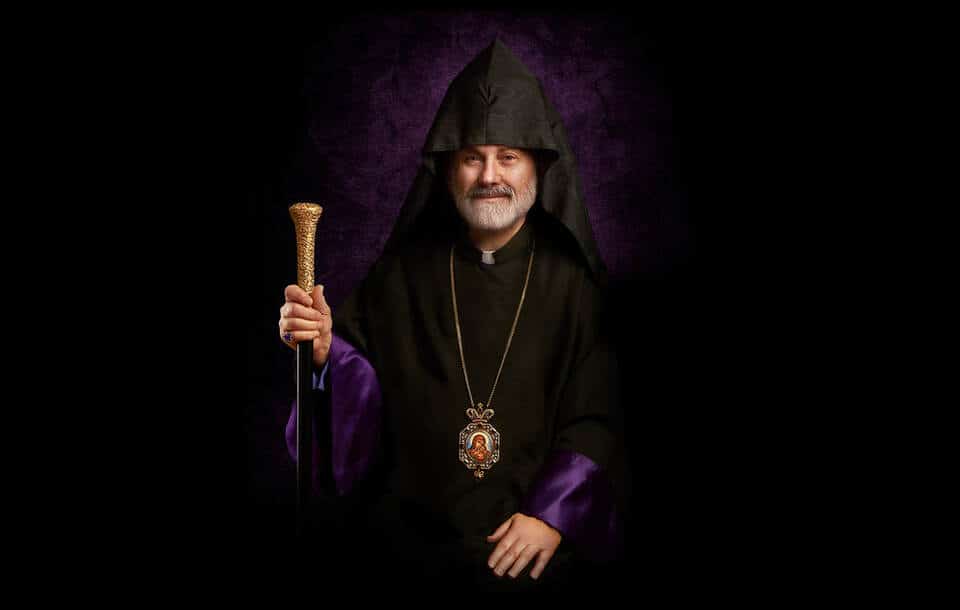RIVERS OF LIVING WATER

The Prelate’s Sermon, February 7
Today on the fourth Sunday following the Nativity, Theophany, and Baptism of our Lord Jesus Christ, the Gospel reading is from John 7:37-52. The Evangelist narrates a very crucial episode, telling that on the last and greatest day of the feast, Jesus stands up and cries out, “If anyone is thirsty, let him come to me and drink” and quotes the prophecy, “Out of the believers’ belly shall flow rivers of living water” (see Ezek 47:1-12 and Zech 14:8). This statement causes infighting among the people and the leaders. Some say that Jesus is “the Prophet” while others say that He is “the Messiah.” Yet, a third group questions whether the Messiah should not come from Bethlehem according to the Scriptures? Parallel to the people’s reaction a split takes place among the authorities. When the chief priests command the officers to arrest Jesus, they do not follow the order, arguing that “never has anyone spoken like this.” The chief priests rebuke them by saying, “Surely you have not been deceived too, have you”? Nicodemus, a member of the Sanhedrin, who had visited Jesus by night sometime before, reminds them that according to the law there is a legal procedure to follow for the arrest. His colleagues mock him saying, “Surely you are not also from Galilee, are you? Search and you will see that no prophet is to arise from Galilee.”
In order to have a better understanding of this solemn statement that Jesus made on this specific day, it is important to have the historical background of the feast itself, known as the Feast of the Booths or the Festival of Tabernacles. The festival commemorates the inauguration of God’s providential care of His people in the wilderness. The rituals were very rich and impressive. Priests in Jerusalem used to carry water from the pool of Siloam to the altar in remembrance of God’s provision of water from the rock (Ex 17:1-7). On the last and great day of the festival, they would recite Psalm 118:25: “Save us, we beseech you, O Lord! O Lord, we beseech you, give us success,” while making seven circuits around the altar.
Having the biblical setting of this stunning announcement, and being led by the Holy Spirit, let us quench the thirst of our souls.
- The timing is well studied and very crucial for this kind of declaration in directing the descendants of the “Desert generation” (that is, the descendants of the children of Israel who wandered in the desert for forty years) into the right way, to acknowledge the continuous care of Divine Providence, symbolically revealed in the past, and now tangibly manifested in Jesus Christ.
- The Manna, the bread sent from the heaven, and the water flowing from the rock were the two monumental signs, assuring the survival of the transitory generation from captivity to the Promised Land. The bestowal of heavenly bread and water affirm that the Giver of life is also the Sustainer, and that nothing is impossible to actualize His will. Jesus identifies Himself as the Heavenly Bread, and with this statement not only does He describe who He is, but what He is in our daily life. Bread and water are the two essential elements for survival in any society, regardless of time and space. They are the alpha of all functions, and the creativity of the body, mind and soul. Thus Jesus, sincerely and in a transparent way, invites us to welcome Him as the most essential part of our lives, and to enjoy His life-sustaining gifts for our growth and prosperity.
- The reaction of the crowd is predictable if not confused. Having witnessed Jesus’ teaching and miracles, some accept Him as the Prophet, most probably Elijah who is supposed to come first (Mark 9:11), and others consider Him to be the long-awaited Messiah. It is very interesting that within the third perspective, which assumes inquisitiveness for having some scriptural knowledge, they question the birthplace of the Messiah. Indeed, all of these perspectives are valid, for in different ways each is within the framework of biblical expectation. We should be indeed grateful to the Evangelists who have included such precious details of the contemporary eyewitnesses, regardless of their status and rank, in presenting the true image of Jesus Christ.
- The approach of the authorities following the report of the officers and of Sanhedrin member is indeed awkward. They were the ones who were supposed to have all the answers for the literate, semi-literate and ignorant crowd. Having faced this kind of a challenge in ages past, surely they had traced the family root of this nonconventional Teacher, and discovered that he was not from Galilee but born in Bethlehem. Yet by denying the truth, they were under the scriptural damnation that they were stiff-necked (Ex 32:9), and that “God’s wrath was upon them, what can be known about God was plain to them, because God has shown it to them” (Rom 1:19).
Let this reading, in all its fullness, with the positive and negative approaches, lead us to orient ourselves not through malice, insecurity and self-centered human judgement, but as the winds filling the sails lead the boat to the safe harbor, likewise may the Holy Spirit, the Wind filling the chamber of our souls, enable us to welcome the uncontainable Maker of the universe into our clean hearts, and being nourished with the heavenly Bread and Water, let us joyfully praise the All-Holy Trinity forever. Amen.
